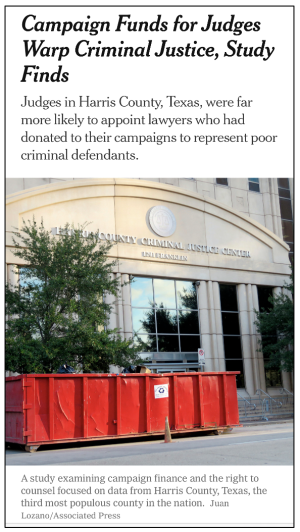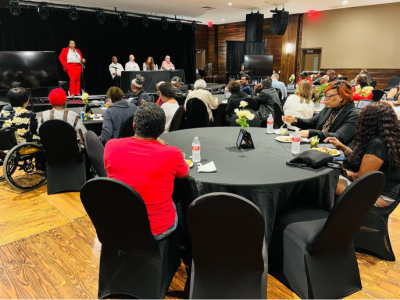PAY-TO-PLAY EXPOSURE: TCJE’s Jay Jenkins worked with Economist Neel Sukhatme, Ph.D., a Georgetown University Law professor, to analyze the impact of campaign contributions on appointment of counsel in Harris County. We co-authored an academic paper – “Pay to Play? Campaign Finance and the Incentive Gap in the Sixth Amendment Right to Counsel” – that links defense attorneys’ financial donations to judges to increased appointments by those judges, as well as to worse representation by donor attorneys.
 The paper was accepted for publication in the Duke Law Journal and was featured in The New York Times in mid-2020.
The paper was accepted for publication in the Duke Law Journal and was featured in The New York Times in mid-2020.
More specifically, this paper included an evaluation of more than 290,000 Harris County felony cases from January 2005 through May 2018 that involved assigned defense counsel. For the first time, we empirically showed that when appointing attorneys to represent indigent clients, elected judges in Harris County were far more likely to choose lawyers who had donated to their campaigns. We also found that defendants were more likely to end up in prison or jail, and received longer sentences on average.
Other key findings from the report are as follows:
- Judges in Harris County often accept donations as an apparent “entry fee” from counsel soon after they become eligible for indigent defense appointments.
- On average, judges assign their donors more than double the number of cases they assign to non-donors, a practice that is inconsistent with the “wheel” assignment system mandated by Texas law.
- Preferential assignment patterns enable donors to earn, on average, more than double the total attorneys’ fees of non-donors; the average donor earns $31,081 in attorneys’ fees from the donee judge–a more than 27-fold “return” on the campaign contribution.
- Donor attorneys are less successful than non-donors in attaining charge reductions, dismissals, and acquittals, or avoiding prison sentences for their clients. This may be due to donors taking on so many cases from their donee judges that they have less time to spend on each matter.
The article amplified an August 2019 article by Neena Satija in Texas Tribune/Texas Monthly about judges receiving donations from attorneys who practice in front of them.
Dr. Sukhatme presented the information to Georgetown faculty, and he and Jay co-presented it at a UT-Austin workshop in October 2019.
Then, in June 2020, Mr. Jenkins and Mr. Sukhatme presented the paper to the Texas Indigent Defense Commission, after which they were invited to be on a legislative workgroup in advance of the 2021 state legislative session.
CAPITAL DEFENSE ISSUES: TCJE evaluated over 5 years of visitor logs to the Harris County Jail – spanning January 1, 2015, to March 1, 2020 – with a focus on attorney visits to people charged with capital murder. Our analysis revealed several shocking facts regarding the representation of capital murder defendants in Harris County, the epicenter of American capital punishment.
Of the 603 defendants we studied:
- 51 individuals received no visits by an attorney during this period.
- 137 individuals were visited by an attorney less than once per year.
- 258 individuals were visited by an attorney less than twice per year.
- 56 individuals (less than 10% of cases) were visited by an attorney more than once per month.
- 12 individuals were convicted but never visited by an attorney.
In February 2024, we released these findings in an issue brief called Absentee Advocacy: Failures in Harris County’s Capital Representation System. This built on Death by Design, a December 2023 report series by the nonprofit Wren Collective (part 1, part 2) that highlighted the failures in how Harris County handles cases where a defendant is accused of capital crimes and potentially faces the death penalty or a life without parole sentence.
In TCJE’s issue brief, we pointed to our own past research on the “pay to play” system and how that perpetuates attorneys’ financial interests over effective counsel. And we ultimately called on Harris County leaders to establish a Harris County Capital Defender Office, per the Regional Public Defender Office (RPDO) model – this is already used in 186 Texas counties, and it’s proven to outperform private court-appointed lawyers. RPDO provides capital representation by assigning teams of 4 people in each case it receives, including two attorneys, an investigator, and a mitigation specialist, all of whom have training specific to capital cases.
 We co-hosted a community town hall in Houston in February 2024 on attorney representation, called “Fighting for Liberty: Improving Indigent Defense in Harris County.” TCJE’s Jay Jenkins joined Jessica Brand [The Wren Collective], Geoff Burkhart [Texas Fair Defense Project], Anthony Graves [Peer Navigator Network], and Sasha Lagette [Pure Justice]. (Photo at left via Pure Justice on X/Twitter)
We co-hosted a community town hall in Houston in February 2024 on attorney representation, called “Fighting for Liberty: Improving Indigent Defense in Harris County.” TCJE’s Jay Jenkins joined Jessica Brand [The Wren Collective], Geoff Burkhart [Texas Fair Defense Project], Anthony Graves [Peer Navigator Network], and Sasha Lagette [Pure Justice]. (Photo at left via Pure Justice on X/Twitter)
NOTE: This research is particularly relevant in light of a judge’s recent recommendation to overturn a death sentence in Harris county on the grounds that the defendant received insufficient legal representation. In the “extremely rare” and “highly unusual” filing, Judge Natalia Cornelio found that lawyers appointed to represent Jeffery Prevost failed to investigate critical information about the defendant’s background and upbringing, and that the lead attorney in his case was overburdened.
